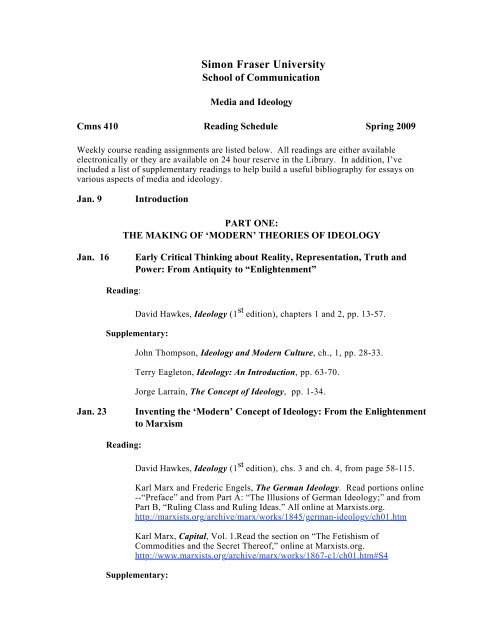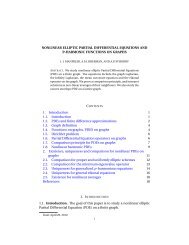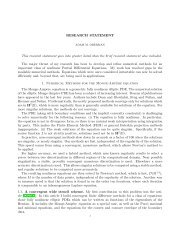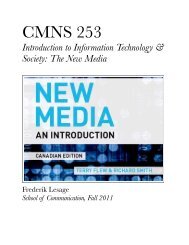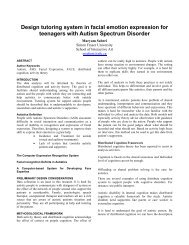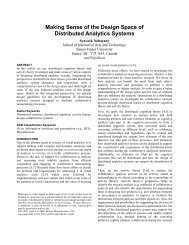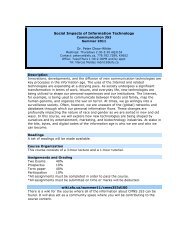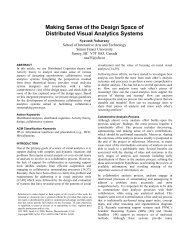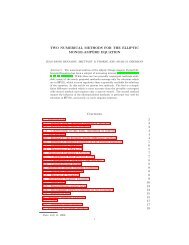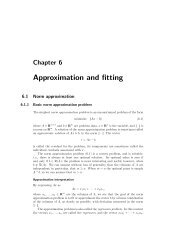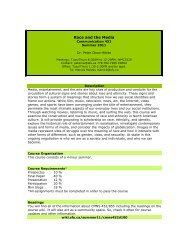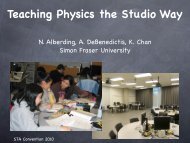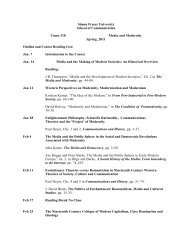410 - SFU Wiki - Simon Fraser University
410 - SFU Wiki - Simon Fraser University
410 - SFU Wiki - Simon Fraser University
You also want an ePaper? Increase the reach of your titles
YUMPU automatically turns print PDFs into web optimized ePapers that Google loves.
<strong>Simon</strong> <strong>Fraser</strong> <strong>University</strong><br />
School of Communication<br />
Media and Ideology<br />
Cmns <strong>410</strong> Reading Schedule Spring 2009<br />
Weekly course reading assignments are listed below. All readings are either available<br />
electronically or they are available on 24 hour reserve in the Library. In addition, I’ve<br />
included a list of supplementary readings to help build a useful bibliography for essays on<br />
various aspects of media and ideology.<br />
Jan. 9<br />
Introduction<br />
PART ONE:<br />
THE MAKING OF ‘MODERN’ THEORIES OF IDEOLOGY<br />
Jan. 16<br />
Early Critical Thinking about Reality, Representation, Truth and<br />
Power: From Antiquity to “Enlightenment”<br />
Reading:<br />
David Hawkes, Ideology (1 st edition), chapters 1 and 2, pp. 13-57.<br />
Supplementary:<br />
John Thompson, Ideology and Modern Culture, ch., 1, pp. 28-33.<br />
Terry Eagleton, Ideology: An Introduction, pp. 63-70.<br />
Jorge Larrain, The Concept of Ideology, pp. 1-34.<br />
Jan. 23<br />
Inventing the ‘Modern’ Concept of Ideology: From the Enlightenment<br />
to Marxism<br />
Reading:<br />
David Hawkes, Ideology (1 st edition), chs. 3 and ch. 4, from page 58-115.<br />
Karl Marx and Frederic Engels, The German Ideology. Read portions online<br />
--“Preface” and from Part A: “The Illusions of German Ideology;” and from<br />
Part B, “Ruling Class and Ruling Ideas.” All online at Marxists.org.<br />
http://marxists.org/archive/marx/works/1845/german-ideology/ch01.htm<br />
Karl Marx, Capital, Vol. 1.Read the section on “The Fetishism of<br />
Commodities and the Secret Thereof,” online at Marxists.org.<br />
http://www.marxists.org/archive/marx/works/1867-c1/ch01.htm#S4<br />
Supplementary:
Terry Eagleton, Ideology: An Introduction, pp. 63-91.<br />
John Thompson, Ideology and Modern Culture, pp. 33-44.<br />
Jorge Larrain, The Concept of Ideology, pp. 35-67.<br />
Louis Dupre, Marx’s Social Critique of Culture, pp.216-275.<br />
John Torrance, Karl Marx’s Theory of Ideas, pp. 191-216.<br />
Slavoj Zizek, The Sublime Object of Ideology, pp. 11-53.<br />
Raymond Williams, Marxism and Literature, ch. 4, pp. 55-71 in the<br />
Oxford Press edition (1977).<br />
January 30<br />
Differing Concepts and Theories of Ideology in the Early Twentieth<br />
Century: From Marx, Engels and Lenin, to Lukacs, Mannheim and<br />
Gramsci<br />
Reading:<br />
Terry Eagleton, Ideology: An Introduction, pp. 93-123<br />
David Hawkes, Ideology, chapter 4, pp. 115-120.<br />
Robert Bocock, Hegemony, chapter 2, pp. 40-54.<br />
Georg Lukacs, History and Class Consciousness, read section I of Lukac’s<br />
chapter on “Reification and the Consciousness of the Proletariat,” on “the<br />
Phenomenon of Reification.” Available online at http://marxists.org/archive/<br />
lukacs/works/history/hcc05.htm<br />
Supplementary:<br />
Terry Eagleton, “Ideology and its Vicissitudes in Western Marxism,” in S.<br />
Zizek (ed.), Mapping Ideology, pp. 179-200 (this is a shortened and<br />
abridged version of the Eagleton chapter noted above).<br />
Nicholas Abercrombie, Class Structure and Knowledge, pp. 32-53<br />
John Thompson, Ideology and Modern Culture, ch., 1, pp. 44-52.<br />
Goran Therborn, Critical Theory and the Legacy of Twentieth Century<br />
Marxism, in Bryan turner (ed.), The Blackwell Companion to Social Theory,<br />
pp. 53-82.<br />
Jorge Larrain, The Concept of Ideology, pp. 68-129.<br />
Bertold Brecht, “Against Georg Lukacs,” in Ernest Bloch et al., Aesthetics and<br />
Politics, (Schocken books edition), pp. 68-85.<br />
Gareth Stedman Jones, “The Marxism of the Early Lukacs,” in New Left
Review (eds.), Western Marxism: a Critical Reader, pp. 11-60, in the Verso<br />
edition.<br />
Carl Boggs, Gramsci’s Marxism, chs. 1 and 2, pp. 21-55.<br />
PART TWO:<br />
THE RETREAT FROM ‘IDEOLOGY’ IN MID-TWENTIETH CENTURY WESTERN<br />
SOCIAL THOUGHT AND THE ‘REDISCOVERY’ OF IDEOLOGY IN THE 1960S<br />
Feb. 6<br />
The Emerging Mid-Twentieth Century ‘Orthodox Consensus’ in<br />
North American Social Theory and Media Studies:<br />
Reading:<br />
Dan Schiller, Theorizing Communication, ch. 2, pp. 39-87.<br />
Daniel Czitrom, Media and the American Mind, ch. 5, pp, 122-146.<br />
Daniel Bell, “America as a Mass Society: A Critique,” in Bell, The End of<br />
Ideology, pp. 21-38.<br />
Supplementary:<br />
Alan Swingewood, The Myth of Mass Culture, pp. 1-23<br />
C.W. Mills, The Power Elite, pp. 298-324.<br />
James Curran et al., “The Study of Media: Theoretical Approaches,” in<br />
Gurevitch et al., Culture Society and the Media, see pp. 30-41.<br />
Dennis McQuail, “The Influence and Effects of Mass Media,” in James<br />
Curran et al., Mass Communication and Society, pp. 70-94 (especially pp.<br />
70-78).<br />
Jesse Delia, “Commucation Research: A History,” in Charles Berger and<br />
Steven Chaffee (eds.). Handbook of Communication Science, ch. 2, pp.<br />
20-98.<br />
Feb. 13<br />
The ‘Rediscovery’ of Ideology: Postwar Radical Political Economy,<br />
‘New Left’ Cultural Politics and the Revival of Critical Theory<br />
Reading:<br />
Max Horkheimer, “Traditional and Critical Theory.” In Paul Connterton<br />
(ed.), Critical Sociology, pp. 206-224<br />
Hans Magnus Enzensberger, “Constituents of a Theory of Media,” in The<br />
Consciousness Industry, pp. 95-128.<br />
Guy Debord, The Society of the Spectacle, read theses 35-53 and 212-221,<br />
available at http://marxists.org/reference/archive/debord/society.htm
Dallas Smythe, Dependency Road: Communications, Capitalism and<br />
Consciousness in Canada, ch. 11, pp. 249-269.<br />
Supplementary:<br />
Herbert Marcuse, One Dimensional Man. Ch. 1 on “New Forms of Control,”<br />
available at http://marxists.org/reference/archive/marcuse/works/onedimensional-man/index.htm<br />
Dominic Strinati, “The Frankfurt School,” in Strinati, An Introduction to<br />
Theories of Popular Culture, (1996 edition), pp. 51-85.<br />
Tom Bottomore, Critics of Society: Radical Thought in North America,<br />
pp. 51-65.<br />
David Hawkes, Ideology (1 st edition), pp. 136-146.<br />
Wallace Clement, The Canadian Corporate Elite, pp. 270-286.<br />
Vincent Mosco, The Political Economy of Communication, pp. 140-172.<br />
Ralph Miliband, The State in Capitalist Society, pp. 196-236.<br />
Schiller, H.I., Mass Communication and American Empire.<br />
Schiller, H. I. The Mind Managers.<br />
Armand Mattelart and Seth Seiglaub, Communication and Class Struggle<br />
(Vols. 1-3).<br />
Feb. 20<br />
Structuralism, Semiology and the ‘Linguistic Turn’ in the Postwar<br />
Study of Ideology<br />
Reading:<br />
R. DeGeorge and F. DeGeorge (eds.), The Structuralists: From Marx to Levi-<br />
Strauss, “Introduction,” pp. xi-xxix..<br />
Jonathan Culler, “Semiology: the Sausserian Legacy.” In Tony Bennett, et.<br />
al., Culture, Ideology and Social Process, pp. 129-143.<br />
Roland Barthes, “Myth Today,” in Terry Eagleton (ed.) Ideology, pp.<br />
162-172.<br />
Louis Althusser, “Ideology and Ideological State Apparatuses,” in Lenin and<br />
Philosophy and Other Essays, available online at http://marxists.org/reference/<br />
archive/althusser/1970/ideology.htm<br />
Jean Baudrillard, “Requiem for the Media,” ch. 9, in Toward a Critique of the<br />
Political Economy of the Sign, pp. 164-184. Available online at http://<br />
www.ubishops.ca/baudrillardstudies/vol4_1/levin.htm<br />
Supplementary:
Dominic Strinati, An Introduction to Theories of Popular Culture, (1996<br />
edition), ch. 3, pp. 88-128, and pp. 146-159..<br />
Janet Woolacott, “Messages and Meanings,” in Michael Gurevitch et al.,<br />
(eds.), Culture, Society and the Media, pp. 91-110.<br />
Edmund Leach, Levi-Strauss, pp. 36-53<br />
David Hawkes, Ideology (1 st edition), pp146-154,<br />
Michel Foucault, The Archeology of Knowledge, ch. 2 on “Discursive<br />
Formations.” (1972, Penguin edition), pp. 31-38.<br />
Alex Callinicos, Althusser’s Marxism, 1976.<br />
R. Lapsley and M. Westlake, Film Theory: An Introduction, pp. 32-66.<br />
John Sturrock, Structuralism, ch.s 2 & 3, pp. 33-102.<br />
Terence Hawkes, Structuralism and Semiotics, ch. 4, pp. 123-160.<br />
Michael Gardiner, The Dialogics of Critique, ch. 3, pp. 58-80.<br />
Feb 27<br />
The Birmingham CCCS, Stuart Hall’s Theory of Ideology, and the<br />
‘Return’ to Gramsci in Postwar Critical Media Studies<br />
Reading:<br />
Dick Hebdige, “From Culture to Hegemony,” in Subculture, the Meaning of<br />
Style, ch. 1, pp. 5-19.<br />
Stuart Hall, "The Rediscovery of Ideology: The ‘Return of the Repressed’ in<br />
Media Studies", in Gurevitch et al., Culture, society and the Media, pp.<br />
55-90.<br />
Stuart Hall, ‘Encoding/Decoding,” in Culture, Media, Language, pp.<br />
128-138.<br />
Chris Rojek, Stuart Hall, ch. 2 on “Representation and Ideology,” pp.<br />
91-131.<br />
Supplementary:<br />
Stuart Hall, “Introduction to Media Studies at the Centre,” and “Recent<br />
Developments in Theories of language and Ideology: A Critical Note,” in<br />
Hall et al., Culture, Media, Language, pp. 117-121 and 157-162.<br />
Stuart Hall, “Cultural Studies; Two Paradigms,” in Tony Bennett et al.,<br />
Culture, Ideology and Social Process, ch. 1, pp. 19-37.<br />
Robert Bocock, Hegemony, ch. 1, on “The Concept of Hegemony,” pp.<br />
21-39.
Chantal Mouffe (ed.), “Hegemony and Ideology in Gramsci,” in Gramsci<br />
and Marxist Theory, ch. 5, pp. 168-204.<br />
Stuart Hall et al., Policing the Crisis, pp. 53-77.<br />
Stuart Hall, Cultural Studies and its Theoretical Legacies, in L. Grossberg et<br />
al.,<br />
(eds), Cultural Studies, pp. 277-286.<br />
Angela McRobbie, “Settling Accounts with Subcultures: A Feminist Critique,”<br />
in Screen Education, no. 34, 1980, and reprinted in Tony Bennett et al,<br />
Culture, Ideology and Social Process, ch. 4, pp. 111-123.<br />
Tony Bennett, “Introduction: The Turn to Gramsci,” in Tony Bennett et al.,<br />
Popular Culture and Social Relation..<br />
Todd Gitlin, The Whole World is Watching, ch. 10.<br />
Todd Gitlin, “Television’s Screens: Hegemony in Transition,” in D. Lazere<br />
(ed.), American Media and Mass Culture: Left Perspectives, pp. 240-265.<br />
Stuart Hall, et al., “Politics and Ideology: Gramsci,” in CCCS, On Ideology,<br />
pp. 45-76.<br />
Nicholas Abercrombie, “Popular Culture and its Ideological Effects,” in N.<br />
Abercrombie et al., (eds.), Dominant Ideologies, pp. 199-228.<br />
PART THREE:<br />
AMBIVALENCE AND RETREAT FROM THE CONCEPT OF IDEOLOGY IN LATE<br />
TWENTIETH CENTURY SOCIAL THEORY, CULTURAL STUDIES,<br />
AND MEDIA STUDIES<br />
March 6<br />
Poststructuralism, Discourse Theories, and the Retreat From Neo-<br />
Marxian Perspectives on Media and Ideology<br />
Reading:<br />
Terry Eagleton, Literary Theory: An Introduction (1 st edition, <strong>University</strong><br />
of Minnesota Press), pp. 127-150.<br />
Chris Weedon, “Feminism and the Principles of Poststructuralism.” In C.<br />
Weedon, Feminist Practice and Poststructuralist Theory.” Reprinted in<br />
John Storey (ed.) Cultural Theory and Popular Culture, pp. 554-566.<br />
Jorge Larrain, Ideology and Cultural Identity, ch. 4, pp. 90-104.<br />
Terry Eagleton, Ideology, An Introduction, ch. 7, pp. 193-220.<br />
Supplementary:<br />
“Critical Theory: From Structuralism to Poststructuralism and Beyond”<br />
http://science.jrank.org/pages/8894/Critical-Theory-From-Structuralism-
Poststructuralism-Beyond.html<br />
David Harris, “Discourse Theories and Critical Cultural Analysis, in A Society<br />
of Signs, pp. 64-86.<br />
David Hawkes, Ideology (1 st edition), 155-176.<br />
Jacques Derrida, “Structure, Sign and Play in the Discourse of the Human<br />
Sciences.” In J. Derrida, Writing and Difference (Routledge edition), pp.<br />
278-294.<br />
Stuart Hall, “Signification, Representation, Ideology: Althusser and the Post-<br />
Structuralist Debates,” Critical Studies in Mass Communication, 2, 1985.<br />
John Sturrock, Structuralism, pp. 135-136.<br />
Sari Thomas, “Dominance and Ideology in Cultural Studies,” in M. Ferguson<br />
and P. Golding (eds.), Cultural Studies in Question, pp. 74-85.<br />
Richard Rorty, “Feminism Ideology and Deconstruction: A Pragmatist View,”<br />
in Slavoj Zizek (ed.), Mapping Ideology, ch. 10, pp. 227-234.<br />
Gary Hall, “Cultural Studies and Deconstruction,” in Gary Hall and Clare<br />
Birchall (eds.), New Cultural Studies: Adventures in Theory.<br />
March 13<br />
Postmodernism, Anti-Essentialism and the Post-Marxist Politics of the<br />
Sign: “New Times,” and the “End of Ideology” (Again) in the 1980s<br />
and 1990s.<br />
Readings:<br />
Yuezi Zhao, “The ‘End of Ideology’ Again The Concept of ideology in the<br />
Era of Postmodern Theory,” Canadian Journal of Sociology, 18(1) 1993.<br />
Jorge Larrain, Ideology and Cultural Identity, ch. 4, pp. 104-118.<br />
Krishan Kumar, From Post-Industrial to Post-Modern Society, Ch. 5, pp.<br />
101-148.<br />
Nick Witheford and Richard Gruneau, “Between the Politics of Production<br />
and the Politics of the Sign: Postmodernism, Post-Marxism and ‘New Times,’<br />
Current Perspectives in Social Theory, 13, 1993, pp. 69-91.<br />
Supplementary:<br />
David Harris, “Postmodernism, Anti-foundationalism and the Aversion<br />
Against the Universal,” in Harris, A Society of Signs, pp. 116-149.<br />
Dick Hebdige, “Postmodernism and ‘The Other Side,’ Journal of<br />
Communication Inquiry, vol 10-2, pp.78-97.<br />
Jean Francois Lyotard, The Postmodern Conditions: A Report on
Knowledge, (selections) available at:<br />
http://www.marxists.org/reference/subject/philosophy/works/fr/lyotard.htm<br />
Frederic Jameson, Postmodernism, (selections) available at:<br />
http://www.marxists.org/reference/subject/philosophy/works/us/jameson.htm<br />
Chris Barker, Cultural Studies: Theory and Practice. Ch. 5, pp 130-161.<br />
Ernesto Laclau and Chantal Mouffe, Hegemony and Socialist Strategy, pp.<br />
93-148.<br />
Michelle Barrett, “Ideology, Politics, Hegemony: From Gramsci to Laclau<br />
and Mouffe,” in S. Zizek, (ed.), Mapping Ideology, 235-264.<br />
Robert Bocock, Hegemony, ch. 5, pp. 103-119.<br />
John Corner, “Postmodernism: The Rough Guide,” in J. Curran, D. Morley,<br />
and V. Walkerdine (eds.), Cultural Studies and Communication, ch. 3.<br />
David Harvey, The Condition of Postmodernity, pp. 39-65.<br />
Christopher Norris, Uncritical Theory – Postmodernism, Intellectuals and the<br />
Gulf War, see ch. 6, “the End of Ideology Revisited.”<br />
Mike Cormack, “Postmodernism, Ideology and Politics,” Media, Culture and<br />
Society, 12, 1990, pp. 545-553.<br />
March 20<br />
Identities, Ideologies, ‘Difference’ and Performance: Mapping Late<br />
Twentieth Century Debates around Imperialism, Race, Gender and<br />
Sexual Preference<br />
Reading:<br />
Edward Said, Culture and Imperialism, read section on “Knowing the<br />
Oriental,” pp. 31-49.<br />
Homi Bhabha, The Location of Culture, selections from the book’s<br />
“Introduction,” http://prelectur.stanford.edu/lecturers/bhabha/location1.html<br />
and “Conclusion,” http://prelectur.stanford.edu/lecturers/bhabha/<br />
location2.html<br />
Gyan Prakash, “Postcolonial Criticism and Indian Historiography,” in Linda<br />
Nicholson and Steven Seidman, Social Postmodernism, pp. 87-100.<br />
Rita Felski, “The Doxa of Difference,” in John Hartley and Roberta E.<br />
Pearson (eds.), American Cultural Studies: A Reader (originally published in<br />
Signs, 23(1), 1997), pp. 208-217.<br />
Supplementary:<br />
Gayatari Spivak, “Can the Subaltern Speak,” in Cary Nelson and Lawrence<br />
Grossberg, (eds), Marxism and the Interpretation of Culture, pp. 66-111.
Chandra Talpade Mohanty, "Under Western Eyes: Feminist Scholarship and<br />
Colonial Discourses". In Third World Women and the Politics of Feminism,<br />
in Chandra Talpade Mohanty, Ann Russo, and Lourdes Torres (eds.), pp.<br />
51-80.<br />
Gayatari Spivak and Sneja Gunew, “Questions of Multiculturalism,” in <strong>Simon</strong><br />
During (ed.), The Cultural Studies Reader, pp. 193-202.<br />
Arif Dirlik, “The Postcolonial Aura: Third World Criticism in the Age of<br />
Global Capitalism,” Critical Inquiry, Vol. 20, #2, Winter, 1994.<br />
Judith Butler, “Imitation and Gender Insubordination,” in John Storey (ed.).<br />
Cultural Theory and Popular Culture, pp. 255-270.<br />
Chandra Talpade Mohanty, “Feminist Encounters: Locating the Politics of<br />
Experience,” in Linda Nicholson and Steven Seidman, Social<br />
Postmodernism, pp. 68-86.<br />
Jorge Larrain, Ideology and Cultural Identity, chs. 1 and 6, pp. 6-32, and<br />
141-166.<br />
Sinesa Malesevic, Identity as Ideology, ch. 4., pp. 83-108.<br />
Homi Bhabha , “Cultural Diversity and Cultural Differences,” in Bill<br />
Ashcroft, Gareth Griffiths, and Helen Tiffin (eds.), The Postcolonial Studies<br />
Reader, pp.206-211.<br />
Sara Sulari, “Women Skin Deep: Feminism and the Postcolonial Condition,”<br />
in Bill Ashcrot, Gareth Griffiths, and Helen Tiffin (eds), The Postcolonial<br />
Studies Reader, pp. 273-282.<br />
PART FOUR:<br />
CONCEPT AT THE CROSSROADS: IDEOLOGY, SOCIAL THEORY<br />
AND CRITICAL MEDIA STUDIES IN THE EARLY TWENTY-FIRST CENTURY<br />
March 27<br />
Re-discovery and Re-assessment of the Concept of Ideology in Western<br />
Social Thought from the 1990s Through the early Twentieth Century<br />
Reading:<br />
John B. Thompson, Ideology and Modern Culture, section on “Rethinking<br />
Ideology, a Critical Conception,” pp. 52-73.<br />
Teun A. van Djik, Ideology: A Multidisciplinary Approach, pp. 1-14.<br />
Terry Eagleton, Ideology: An Introduction, ch. 2, pp. 33-61.
Supplementary:<br />
Slavoj Zizek, “The Spectre of Ideology,” in Slavoj Zizek (ed.), Mapping<br />
Ideology, pp. 1-33.<br />
John Corner, “Ideology: A Note on Conceptual Salvage,” Media, Culture and<br />
Society, 23(4), 2001, pp. 525-533.<br />
Fabio Vighi and Heiko Feldner, Zizek: Beyond Foucault, see Part One, pp.<br />
7-73.<br />
Pierre Bourdieu and Terry Eagleton, “Doxa and Common Life: An<br />
Interview,” in Slavoj Zizek, Mapping Ideology, pp. 265-277.<br />
Slavoj Zizek, “How Did Marx Invent the Symptom” in Slavoj Zizek,<br />
Mapping Ideology, pp. 296-331.<br />
Slavoj Zizek, “Welcome to the Desert of the Real,” (2001), http://<br />
web.mit.edu/cms/reconstructions/interpretations/desertreal.html<br />
Tim Dant, Knowledge, Ideology and Discourse, pp. 228-236.<br />
Jacques Derrida, “What is Ideology” in Jacques Derrida, Spectres of Marx,<br />
http://www.marxists.org/reference/subject/philosophy/works/fr/derrida2.htm<br />
Robert Porter, “A World Beyond Ideology Strains in Slavoj Zizek’s<br />
Ideology Critique,” in Sinesa Malesevic and Iain MacKenzie (eds.), Ideology<br />
After Poststructuralism, ch, 3, pp. 43-63.<br />
Ernesto Laclau, “The Death and Resurrection of the Theory of Ideology,”<br />
Journal of Political Ideologies, 1(3), 1996, pp. 201-220.<br />
April 3<br />
Reading:<br />
Reconsiderations Is the Concept of Ideology Still Relevant in the Twentyfirst<br />
Century<br />
Sinesa Malesevic, “Rehabilitating Ideology After Poststructuralism,” in Sinesa<br />
Malesevic and Iain MMackenzie (eds.), Ideology After Poststructuralism, ch.<br />
5-87-110.<br />
Supplementary:<br />
Richard Johnson, “Post-Hegemony I Don’t Think So.” Theory, Culture and<br />
Society, 24(3), 2007, pp. 95-110.<br />
Chris Rojek, “The Future Belongs to the Impure,” in Chris Rojek, Stuart Hall,<br />
pp. 186-198.<br />
Rosi Braidotti, “A Critical Cartography of Feminist Post-Postmodernism,”<br />
Australian Feminist Studies, Vol 20(47), 2005, pp. 1-15<br />
Gayil Tashir, “The Phoenix of Ideology,” Critical Review of International<br />
Social and Political Philosophy, 9(2), 2005, 107-124.
Maeve Cook, “Resurrecting the Rationality of Ideology Critique: Reflections<br />
on Laclau on Ideology,” Constellations, 13(1), 2006, pp. 4-20.<br />
Patrick Williams, “Totally Ideological,” Interventions, 1(2), 1999, pp.<br />
282-285.<br />
Mathew Humphrey, “Decontesting Ideology: The Struggle Over the Meaning<br />
of the Struggle Over Meaning,” Critical Review of International Social and<br />
Political Philosophy, 9(2), 2005, pp. 225-246.<br />
Terry Eagleton, Postcolonialism and ‘Postcolonialism,’ Interventions, 1(2),<br />
1999, pp. 24-26.<br />
John Corner, “Mediated Politics, Promotional Culture and the Idea of<br />
‘Propaganda,’ Media, Culture and Society, 29(4), 2007.


